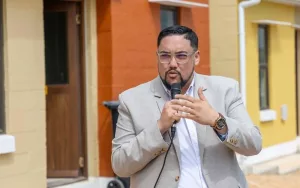President Cyril Ramaphosa of South Africa has been vocal about the urgent need to tackle corruption in the country, calling it a threat to democracy. He aims to create a society where corruption is nonexistent and upholds the principles of social justice, human dignity, accountability, transparency, and the rule of law. The battle against corruption requires the cooperation of law enforcement agencies, the judiciary, the media, civil society, and citizens of South Africa, and significant resources have been allocated towards rebuilding law enforcement agencies and other bodies devastated by state capture.
Minister Zikalala of South Africa is on a mission to attract investment in vital sectors such as energy, water, telecommunications, and transport, to promote economic growth. He is showcasing South Africa as an ideal hub for infrastructure investment, with a focus on establishing enduring, mutually beneficial ties with stakeholders and cultivating fresh alliances in the infrastructure market. The department is committed to transparency and inclusivity in its engagement with interested entities.
Judge Thulare exposed the shocking extent of gang involvement within SAPS, revealing that the 28 gang had infiltrated the senior management of SAPS in the Western Cape. IPID promised to investigate, but their silence raises concerns about their intentions and progress. However, the Western Cape Government remains committed to pursuing transparency and accountability in the fight against corruption and gangsterism within SAPS, insisting on removing any implicated officers from service and protecting citizens from corrupt individuals.
The BreedeOlifants Catchment Management Agency (BOCMA) and the Department of Water and Sanitation (DWS) have launched an enforcement campaign in Klein Karoo to address illegal water use and ensure adherence to the National Water Act. The Blue Scorpion Inspectorate, consisting of BOCMA and DWS personnel, is conducting inspections to catch wrongdoers and promote responsible water usage. The campaign highlights the significance of water conservation and the role of government agencies in preserving natural resources for sustainable future generations.
Cape Town has introduced an online booking system to help residents avoid long queues and waiting times during the busy holiday season. Users can also take advantage of eServices, such as renewing vehicle licenses or submitting water meter readings, to save time and effort. The city has prioritized senior citizens, pregnant individuals, and disabled customers to expedite their transactions, and diverse payment options are available for municipal and City rental payments.
Beijing Jiaotong University has awarded an Honorary Professorship to South African Minister Blade Nzimande in recognition of his contributions to education and to strengthen ties between the two countries. Minister Nzimande expressed his gratitude for the honor and acknowledged the support and friendship from China throughout his career. The prestigious recognition presents an opportunity for deeper partnerships and enhanced collaboration in education and innovation.
The National Student Financial Aid Scheme (NSFAS) is facing a crisis due to irregularities and mismanagement, which could severely impact the futures of many young South Africans. Minister Blade Nzimande has demanded a response from the NSFAS Board and requested a detailed account of their participation in the process, as well as a comprehensive plan to implement the report’s recommendations and investigate allegations made by the former CEO. The board needs to take prompt action to rebuild trust and stability as the NSFAS is vital for funding higher education in South Africa.
Unveiling Cape Town takes readers on a journey through the city’s diverse and enthralling tales. From demands for government accountability to spooky hikers and amended national park fees, to heartwarming exchanges between Springbok captain Siya Kolisi and President Cyril Ramaphosa, Cape Town’s unique character shines through. The article showcases the city’s resilience, collaboration, and humor, culminating in the triumphant homecoming of the Springbok team and the promise of lasting memories for visitors.
Cape Town is seeking to streamline its disaster relief funding process by decentralizing it, allowing prompt aid to residents affected by fires and floods. Councillor Carl Pophaim has requested funds be allocated directly to capable municipalities like Cape Town, guaranteeing effective and viable emergency response. The city has faced increasing severe fires and floods, with existing national regulations hindering their initiatives. Decentralizing disaster relief funding may present a solution to offer immediate support to those affected.
The closeknit community of Blowy informal settlement in Khayelitsha, Cape Town, has shown remarkable resilience and determination to rebuild their lives and homes after a devastating fire left over 500 individuals homeless and hungry. The community is highlighting the need for innovative urban planning strategies to prevent future tragedies and urging the City of Cape Town to address overcrowding in informal settlements. Despite the challenges, NGOs and the community’s unwavering spirit are providing support and hope for a brighter future.
Milky Chance, the acclaimed German indiepop band, is set to make a remarkable comeback to South Africa in February 2024 with their “Living In A Haze” tour. The tour will feature exhilarating performances in Cape Town, Johannesburg, and Durban, serving up a musical feast for eager fans. Tickets are available for purchase, with prices starting at R595 for general admission and R995 for the exclusive Golden Circle phase one. The anticipation surrounding their tour is palpable, and the band is excited to reconnect with the local fans they felt embraced by during their last visit to South Africa.
The River Warden Programme in Cape Town is a job creation initiative that aims to preserve the city’s waterways and green areas. River Wardens perform tasks such as eradicating invasive flora, restoring waterways, collecting litter, and building infrastructure. The program has generated over 200 job opportunities since its inception, contributing to redefining the role of green spaces in Cape Town’s urban landscape and promoting social unity.
The National Treasury is calling for technical tax proposals from taxpayers and the public for the 2024 Budget Review. The proposals should aim to address revenue leakages, loopholes, and technical issues in existing tax legislation. The submission deadline is November 24th, and virtual workshops will take place in December 2023. The final decision on inclusion rests with the Finance Minister.
The City of Cape Town is seeking public feedback on proposed traffic calming measures to enhance pedestrian safety in various neighborhoods. Residents can provide their opinions on the plans, which are available on the city’s website and at various subcouncil offices and libraries. The city is offering special assistance to disadvantaged groups to ensure their input is documented and submitted. Cape Town’s approach to involving local communities in urban planning serves as an example for others to follow in creating safer and more inclusive cities.
South Africa is committed to protecting journalists’ rights and promoting democracy. The government supports the International Day to End Impunity for Crimes Against Journalists and honors journalists on Black Wednesday. The Government Communication and Information System (GCIS) holds panel discussions on cyberbullying against female journalists and strives to foster safe reporting during elections. While challenges like cyberbullying and harassment remain, South Africa’s commitment to protecting journalists is praiseworthy.
The recent court ruling supports the government’s decision, raising discussions on the role of government intervention in higher education and the equilibrium between institutional autonomy and public interest, as The University of South Africa (Unisa) has faced legal conflict over the government’s decision to appoint an Administrator to oversee its operations, with Unisa arguing that this would encroach on its autonomy and potentially harm the quality of its academic programs. The outcome of this decision and its impact on Unisa and the broader higher education landscape remain uncertain.
















